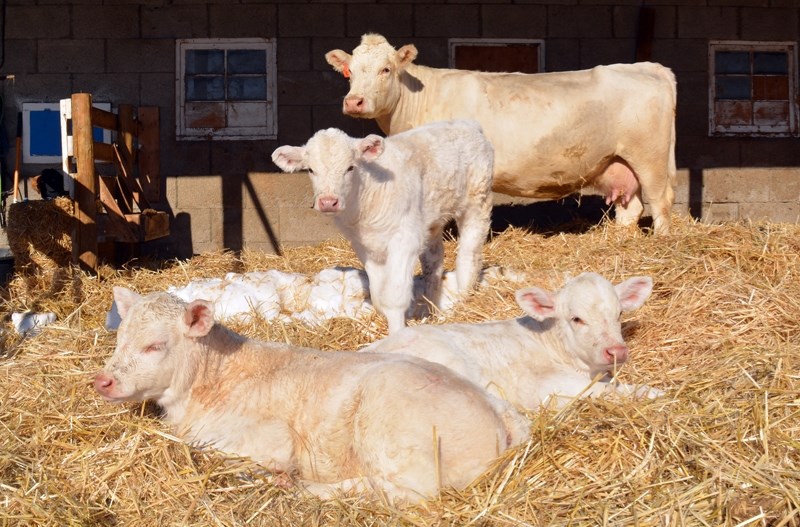They say good things come in threes.
For the Rasmussen family, good things arrived in the way of Charolais triplets.
Their 13-year-old Charolais dam Raindrop gave birth to two males and one female at midnight on Jan. 18 on the family farm southeast of Innisfail.
"This is the first time (we've had triplets)," said Jeralyn Rasmussen, co-owner of the HEJ Charolais farm. "It was exciting. It put a smile on our face."
The rare triplet birth came as a surprise to everyone, including Dr. Greg Schierman of Poplar Grove Veterinary Services, who was called in to assist with the delivery.
"I think we were all quite happily surprised to find a third calf. To (deliver) three of them alive like that is pretty uncommon," said Schierman.
"I've developed a habit to always check for a second calf, but when I went in to check for a third calf it was more as a joke. I really didn't expect to find a third one," he added with chuckle.
It was the second set of cow triplets that Schierman has delivered during his 23-year career as a veterinarian.
The Innisfail-area farm is owned and operated by Jeralyn, her husband Henrik and their daughter Marina. They are seed stock producers and raise and sell purebred Charolais in a variety of colours, including white, tan, red and black.
Raindrop gave birth to the triplets in less than 10 minutes, said Rasmussen.
"She took them all. Sometimes there'll be one that they reject but she never did," she said, noting daughter Marina has helped feed the calves, supplementing their mother's milk with a bottle twice a day.
"The female is always hungry. She follows Marina everywhere," said Rasmussen, adding the calves weighed about 60 pounds each at birth.
"They were a good size. An average Charolais (calf) from a cow like her would be about 105 pounds," said Rasmussen. "She looked pretty thin after the birth and she was stunned. You could see she was shocked (by the triplets)."
The gestation period for a Charolais is 285 days explained Rasmussen, noting the birth came two weeks early.
While she said it is common to name the calves, they have not yet chosen names for the triplets, adding that it may take some time to consider names for the special delivery.
The triplets will remain on the farm for the foreseeable future.
"They'll stay with their mother until September or October and then be weaned. We'll decide what to do with them after that," Rasmussen concluded.



